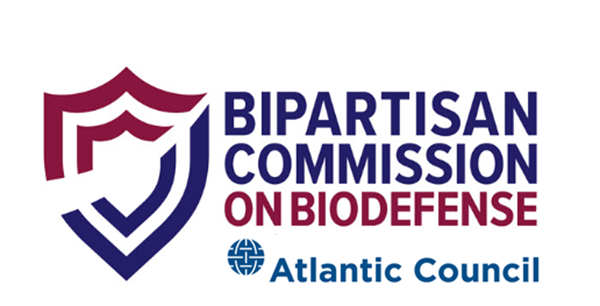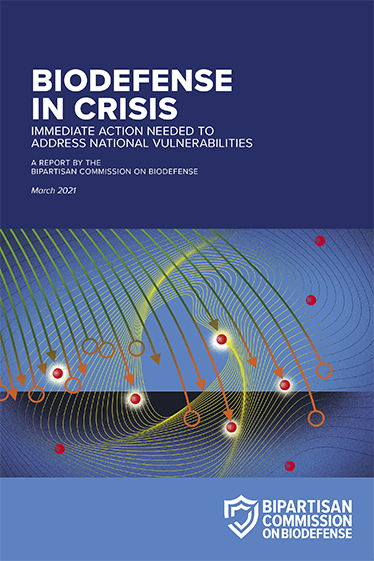- PREFACE
- INTRODUCTION
- INDICATORS OF PROGRESS
- CONCLUSION
- IMPLEMENTATION STATUS
- Leadership
- Coordination
- Collaboration
- Innovation
- ACRONYMS
- ENDNOTES
Commissioners
Joseph I. Lieberman, Chair
Thomas J. Ridge, Chair
Donna E. Shalala
Thomas A. Daschle
James C. Greenwood
Kenneth L. Wainstein
Ex Officio Members
Yonah Alexander, PhD
William B. Karesh, DVM
Rachel Levinson, MA
I. Lewis Libby, JD
Gerald W. Parker, DVM, PhD
George Poste, DVM, PhD, DSc
Tevi Troy, PhD
Commission Staff
Asha M. George, DrPH, Executive Director
Robert H. Bradley, Policy Associate
John T. O’Brien, MS, Research Associate
Patricia de la Sota, Operations Manager
Acknowledgments
The Bipartisan Commission on Biodefense thanks the many subject matter experts and government officials who provided valuable information and insights as we evaluated the implementation of our recommendations from the Commission’s first report, A National Blueprint for Biodefense: Leadership and Major Reform Needed to Optimize Efforts (2015) and how those recommendations would have impacted the initial 2019 novel coronavirus response. The Commission thanks Lisa O. Monaco for her valuable contribution and insight. We thank Dr. Ellen Carlin for her research perspicacity and assistance with developing the findings in this report. We are grateful for the perspectives of our ex officio members on public and private sector capacity and capability, as well as the national and global environments in which biodefense occurs. We thank Hudson Institute for serving as our fiscal sponsor. The Commission also expresses its gratitude for the financial support our donors provide.
Preface
To the President, Congress, and the American People:
We convened the Bipartisan Commission on Biodefense more than six years ago in recognition of the severity of the biological threat and the lack of cohesive national preparedness for a large-scale event. In the hopes of preventing calamity, we produced our foundational report in 2015, A National Blueprint for Biodefense, in which we noted that the Nation was dangerously vulnerable to biological threats — including an infectious disease pandemic or a terrorist attack with biological weapons. Addressing the totality of federal biodefense policies and programs, the report offered improvements for how the government could prevent, deter, prepare for, detect, respond to, attribute, recover from, and mitigate a biological event. However, little was done in response to warnings and recommendations from our Commission and others.
Unfortunately, the Coronavirus Disease 2019 (COVID-19) pandemic has proven us correct. The disease has inflicted great human and economic losses upon our country. We thank, applaud, and support the tireless work of researchers, public health professionals, healthcare deliverers, and frontline responders to bring the pandemic to an end.
COVID-19 continues to threaten the Nation and will remain a constant presence in our lives even with a successful vaccination campaign. Unfortunately, this pandemic will not be the last. Strong federal leadership is critical to enable the Nation to better defend against biological threats. Lessons can and should be learned from what went right during the various stages of response to COVID-19, as well as what went wrong.
The Executive and Legislative Branches did act on several of our recommendations. Most notably, the government developed and released a National Biodefense Strategy in 2018, in accordance with the third recommendation in A National Blueprint for Biodefense. Some Members of Congress and officials within the Obama, Trump, and Biden Administrations have also recognized the dire threat that pathogens pose and acted accordingly.
Regrettably, most of the Commission’s recommendations were unaddressed or only partially addressed before the COVID-19 pandemic began. Had the government fully implemented A National Blueprint for Biodefense or responded to warnings from experts, the Nation would have been much better prepared for COVID-19. Our recommendations would not have prevented infectious disease, but their adoption would have greatly assisted the federal government and its state, local, tribal, territorial, and non-governmental partners in preventing COVID-19 from becoming a pandemic.
We urge the public and private sectors to identify and act upon the difficult lessons learned from the current pandemic and place a high priority on combating the continuing biological threat to America and the world. We must do this now. Countless lives can be saved in the future by federal leadership; many lives will be lost without it.
Copyright © 2021 by the Bipartisan Commission on Biodefense. All rights reserved. www.biodefensecommission.org
Cover illustration by Brian Stauffer.
Other graphics and design by Factor3 Digital
Bipartisan Commission on Biodefense. Biodefense in Crisis: Immediate
Action Required to Address National Vulnerabilities.
March 2021.

